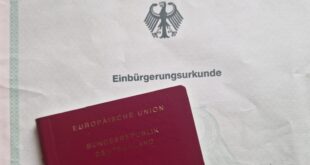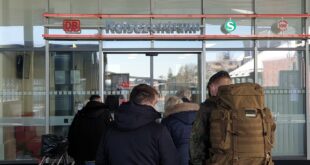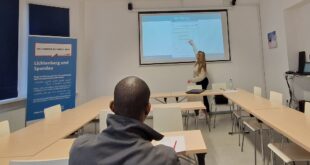Chancellor Angela Merkel and the heads of the federal states (Länder) after a crucial meeting on Tuesday agreed on new corona pandemic containment measures in Germany. Among them are a lockdown extension and new, stricter rules on the types of masks that must be worn in certain public places. An overview of the new measures.
—
Extension of the lockdown
The measures in force, which previously were to expire at the end of January, have been extended until 14 February 2021.
Contact restriction
The contact restrictions remain as strict as before. “Private gatherings will continue to be permitted only among members of one’s household and one other person not living in the household.” The number of households from which the additional persons come should be kept as small and constant as possible.
Medical mask requirement in public transport and shops
The existing obligation to wear masks has been toughened: Henceforth, “clinical masks” (surgical masks or masks of the KN95 or FFP2 standard) will be mandatory on public transport and in shops. Simple everyday masks are no longer enough.
Public transport
Contacts on buses and trains are to be reduced through “home office options, equalisation of passenger volumes during peak hours and deployment of additional means of transport”. To further reduce public transport use at rush hours, companies are encouraged to employ flexible working hours wherever possible.
Schools
Day-care centres and schools will generally remain closed until 14 February.
More home office
The Ministry of Labour will issue a regulation “requiring employers to allow employees to work from home wherever possible”. Workers would be asked to accept the offer. The temporary regulation will be in force until 15 March.
Where workplace presence is still required, the number of people in confined work areas must be reduced as part of the implementation of occupational health and safety standards. Employers are also required to provide medical masks to their employees.
Rapid tests and FFP2 obligation for nursing and old people’s homes
Staff in nursing and care homes and in facilities for persons with disabilities will in future be obliged to wear FFP2 masks when they come into contact with residents. Staff and visitors are to be tested for Corona with rapid tests “several times a week”.
Religious worship
Services in churches, synagogues and mosques as well as meetings of other religious communities are only permitted under the following conditions:
- The minimum distance of 1.5 metres must be maintained
- The obligation to wear a medical mask also applies
- Congregational singing is prohibited.
- Gatherings of more than 10 people must be registered with the public order office (Ordnungsamt) at least two working days in advance
Local and regional restrictions
In districts (Landkreise) and states with high infection incidences, state governments should continue to take extensive local and regional measures that go beyond the general rules.
The major goal of the new measures is reaching an incidence of 50 new infections per 100,000 inhabitants per week by mid-February even in regions where incidence is currently still particularly high.
Sola Jolaoso
READ ALSO Essential information about the lockdown extension in Germany
 THE AFRICAN COURIER. Reporting Africa and its Diaspora! The African Courier is an international magazine published in Germany to report on Africa and the Diaspora African experience. The first issue of the bimonthly magazine appeared on the newsstands on 15 February 1998. The African Courier is a communication forum for European-African political, economic and cultural exchanges, and a voice for Africa in Europe.
THE AFRICAN COURIER. Reporting Africa and its Diaspora! The African Courier is an international magazine published in Germany to report on Africa and the Diaspora African experience. The first issue of the bimonthly magazine appeared on the newsstands on 15 February 1998. The African Courier is a communication forum for European-African political, economic and cultural exchanges, and a voice for Africa in Europe.







